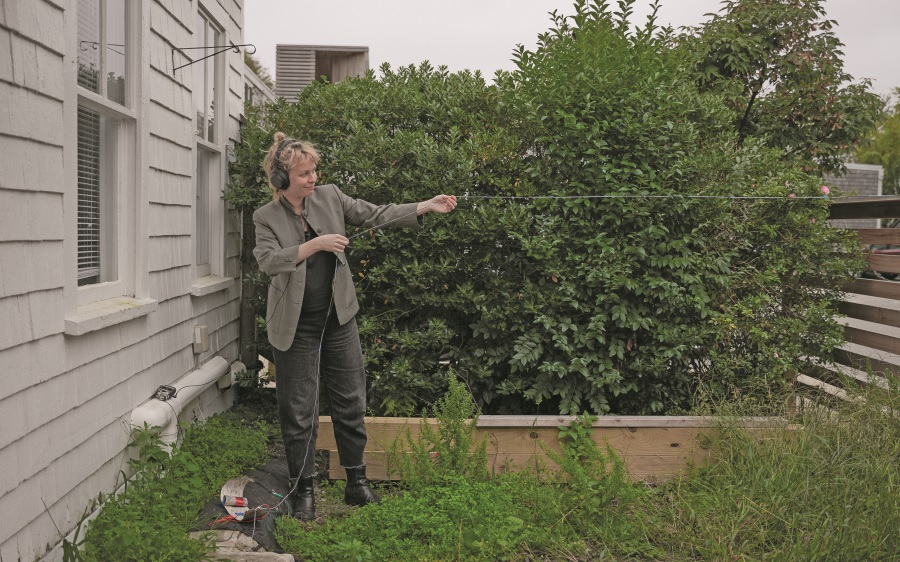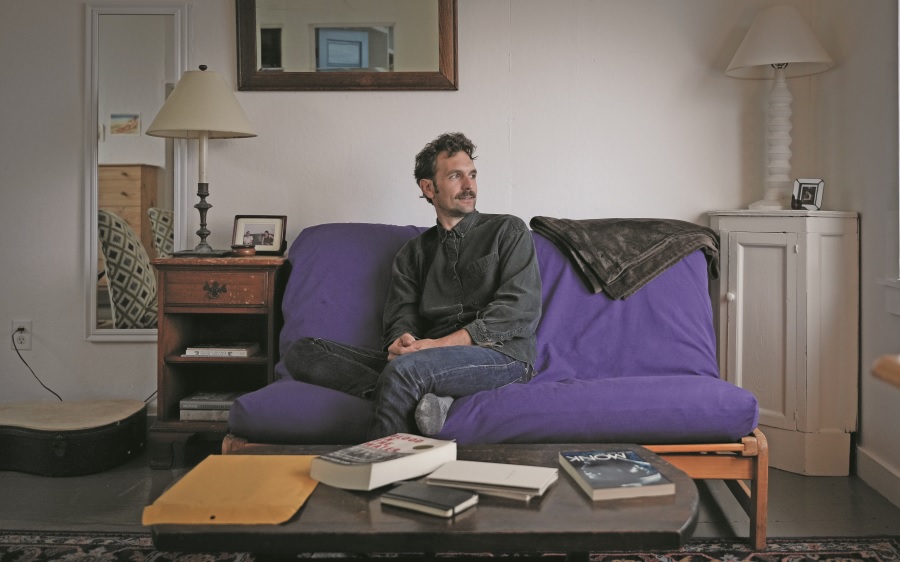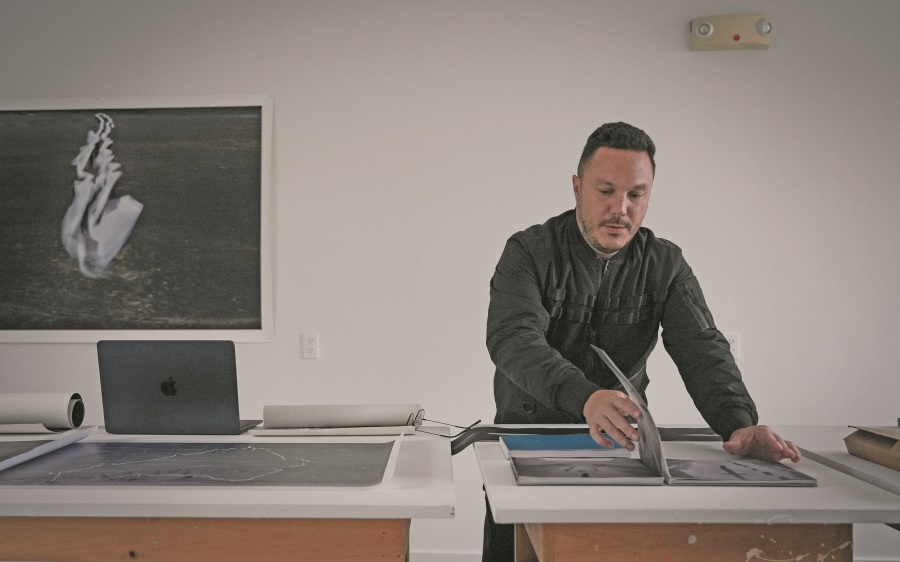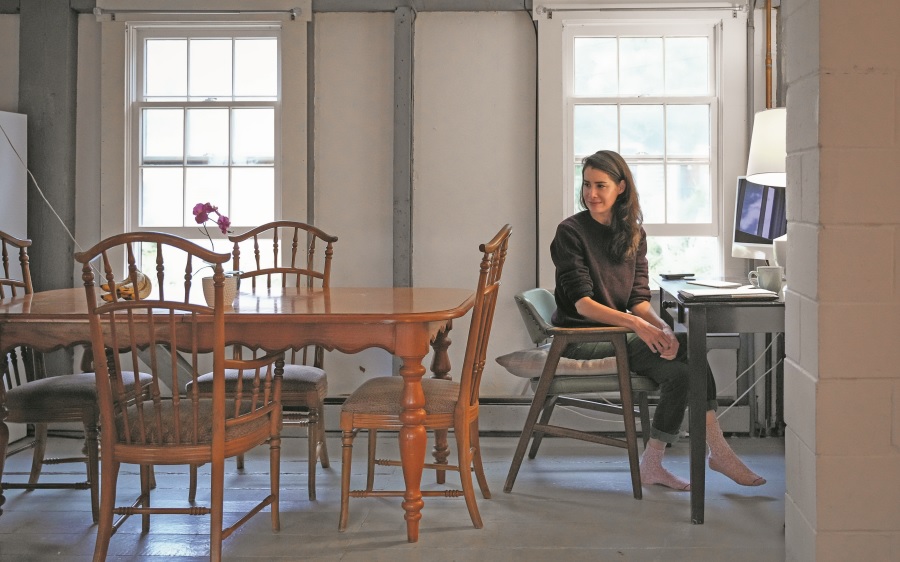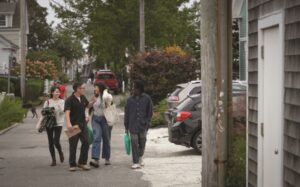“I want to write about the people in my life in a way that shows how beautiful and complex they are,” says poet David Hutcheson. He runs to his kitchen to grab some honey.
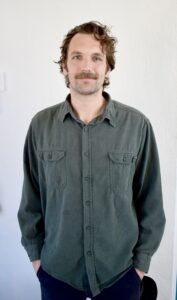
It’s 13 minutes till midnight on Brewster Street in Provincetown, and Hutcheson is reading his new poem, “Top-Siders.” The poem is about fishing with his father and brother — eating “cold fried chicken for breakfast in the marina dark” as diesel fuel’s “little rainbows/ rippled in the slip.” About how, once dawn broke, his father “seemed even quieter, suddenly drunk.” About the way his father would sing the word darlin’. Hutcheson reads: “the same song/ in my mouth whenever I call the dogs.”
Hutcheson’s father died two years ago from complications of alcohol abuse. “It’s something I’d seen coming for years but still couldn’t prepare myself for,” he says. “I started writing again the winter after my dad died. I hadn’t written poems since I quit drinking” — that was in 2019 — “and it was slow going at first. But by the summer I wrote a whole bunch, and it became easy. It was like there was nothing in my way anymore.”
Hutcheson says that when he was drinking, he wanted to redeem the mess of his life with what he made, wanted his poems to somehow prove he was worthy of love. “But writing doesn’t do that,” he says. “After a few years, those preoccupations faded away, and writing could just be fun again — like an old friend.”
When he first arrived at the Fine Arts Work Center in October he was “on a tear,” writing every night, including a series of poems about his father. “All I had to do was show up and listen,” he says. “There was a real need welling up from somewhere, and I just tried to shape that and capture it.”
In writing about his family, he says, “My subjectivity is of course implicated in every stylistic choice I make, every tonal shift, every detail I decide to pull in. But lately I’m pulling the observations further back to try to create more of a world in these poems. I write about the people I love not because of their proximity to me but because of the particular ways they have tried to live meaningful, authentic lives in the face of the forces of alienation America uses to crush its subjects.”
Hutcheson, 35, is from Rocky Mount, N.C. where, he says, “it’s neither rocky nor mountainous.” He majored in English at the University of North Carolina Chapel Hill, where he worked at the radio station and fell asleep reading Shakespeare in the library. The poet Alan Shapiro was his mentor. Before Shapiro’s class he had written only music. He was transfixed by Shapiro and the way he quoted poetry from memory.
“I was subdued in college,” says Hutcheson. “I turned into a wild man later.”
After graduating, he left for New York and received his M.F.A. at Hunter College, studying with poet Tom Sleigh. He lived in Ridgewood, Queens in an apartment with weird mannequins and trash art on the walls.
Hutcheson stayed in the city for four years, “writing poems and living dirt cheap.” They were city poems. “I was doing the flaneur thing,” he says. “I’d walk aimlessly through Queens. I was sort of manic. The poems were about being in this magical liminal space shot through with pain. I was experimenting with different music, modes, personas.”
During Hutcheson’s first FAWC fellowship in 2017, he met the poet H.R. Webster, who is now his partner. She recommended reading about the prison system and abolitionist politics. It helped Hutcheson understand what had happened to his brothers.
Both brothers, he says, were in prison at the time for serious crimes. “I started to better understand the systems that had led them to prison as well as the shame I felt,” he says. “When people are incarcerated, they are disappeared from society. They are talked about either in punitive terms or not at all. Their loved ones internalize that shame.
“When you have a family story like mine, people tend to receive it through a Southern gothic lens that’s aimed at closure or redemption,” he says. “I’m not interested in closure or in writing elegiacally about drinking or shooting dope. Recovery from addiction and release from imprisonment are narrativized in capitalist terms, as if the goal is to become a productive member of society. I think this is a false, harmful, and oppressive idea. Getting high and stealing are ways of resisting capitalism. I tell the stories I believe are important to tell — presenting the deeds (and misdeeds) of people I love in a way that doesn’t instrumentalize them and in a way that neither romanticizes self-harm nor conceives of a life’s value in terms of capital.”
Hutcheson says he’s been letting his poems come out from behind their interest in language in order to tell stories. The first poems he made when he started writing again last year were composite portraits of his father, “something about the sonic quality of his accent, the way he would talk, his physical bearing. It didn’t tell a story, but it captured an essence.”
On a typical day Hutcheson gets up, has some oatmeal and coffee, and reads for 30 minutes. He talks on the phone to Webster, who is back at their home in Kingston, N.Y. He runs 10 miles and eats a big lunch.
“I’ll lie on the couch for a little bit,” he says. After dinner he dresses for work. “If I’m being bad, I smoke a cigarette.”
When Hutcheson feels himself getting worked up to write a poem, he sits down at his typewriter and turns on the lamp that’s just for writing. He starts with a specific image.
“If my brain’s in a good place,” he says, “I’ll make a cup of coffee, usually around 8 or 9 o’clock at night, tell myself I’m going to write a poem, tell myself I can do whatever I want with it.” Then he takes the handkerchief off his typewriter.
“I like the typewriter because you’re making a commitment when you’re working on those keys,” he says. “You think of a line and you bang it up — maybe a line and a half — and you stop and think before you go on to the next one.”

